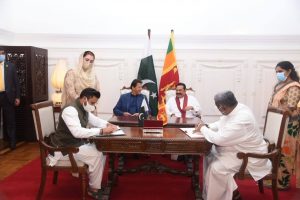One year on from the pandemic, Sri Lankan Muslims are still being forced to cremate their loved ones. Even Muslims who have not died from COVID-19 have been denied their preferred funeral rites over supposed public health concerns.
Amid this context, on February 23, Pakistan’s Prime Minister Imran Khan landed in Sri Lanka on an official visit to the country in a bid to strengthen ties. Many Sri Lankan Muslims are calling on Khan to address the rise in Islamophobic incidents in the country and targeted forced cremations, which have still not been resolved. The Sri Lankan government had pledged that they would be stopping forced cremations of Muslims, a move that was welcomed by Khan. However, forced cremations continue and no policy has been introduced to ensure that Muslims have the right to bury the dead during the pandemic.
Since the Rajapaksa brothers returned to power in 2019, Sri Lankan Muslims and minority groups have felt under threat. Under the Rajapaksa government, many Muslims have had to face an increased level of Islamophobia, sparking fears of a return to the days of the 2014 Aluthgama attacks and riots, which had targeted many Muslim minority citizens of Sri Lanka. Since the Easter bombings, tensions had further increased, with many Muslims feeling like they are being targeted with Islamophobia. A ban was put on wearing face coverings in public – to include Muslim face veils – and further attacks on Muslim businesses took place with little action from the government.
Muslims in the country have now pinned their hopes on Khan’s two day visit to the country and are urging him to speak up about the ongoing issue of forced cremations. Trade and commerce are a major focus of the prime minister’s visit to Colombo, but the marginalized Muslim community wants to ensure that his visit champions the rights of Muslims as well.
Victims of forced cremations and their families have appealed to Pakistan and many other Muslim countries to ensure that the inhumane policies that have been put in place by the Sri Lankan government are reversed. It is hope that Khan’s visit will not only be a time of trade talks but also bring a possible opportunity for change for the Muslim minority in Sri Lanka.
As a Sri Lankan Muslim myself, living in the U.K., I have heard from family members the incidents of Islamophobia they have had to face first-hand and the sadness of having to cremate loved ones against their wishes. COVID-19 has been weaponized by the Sri Lankan government to further target its Muslim minority.
To cite just one example, my cousin, who was heavily pregnant, went to the hospital for a routine check-up. She had no symptoms of COVID-19, but the hospital told her that she had to have a C-section, claiming she was “80 percent COVID positive,” an assertion that makes no scientific sense. Subsequently my cousin was sent into quarantine far away from the town where she lives, and had to give birth alone, without any help. There have been many other incidents of Muslims being targeted in different ways, with the pandemic used as an excuse. Without international intervention the Rajapaksas will continue to evade accountability for the rising tide of Islamophobia.
Hope are high that Pakistan’s Imran Khan will be able address the issues affecting Sri Lanka’s minority Muslims and ease existing tensions in the country.
Tasnim Nazeer is an award-winning journalist and Universal Peace Federation Ambassador for Peace.

































